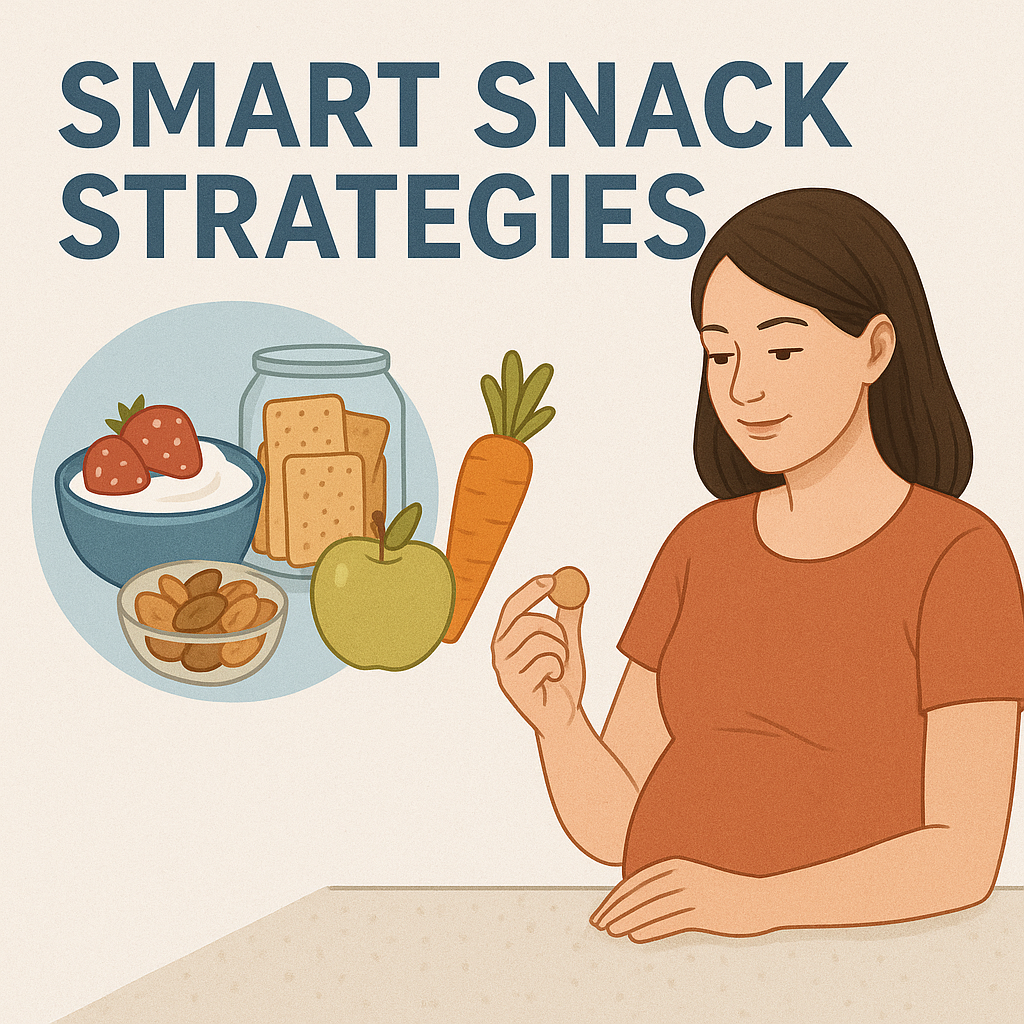Gestational Diabetes Mellitus (GDM) is a condition that occurs in numerous pregnant women and is identified at the 24th to 28th weeks of pregnancy. Snacks play an important role in managing gestational diabetes by helping maintain steady blood sugar levels throughout the day. Choosing the right combination of nutrients especially fiber, protein, and healthy fats can prevent sudden glucose spikes and keep energy levels stable. Healthy snacking also supports the baby’s growth while ensuring the mother stays full and nourished.
Gestational Diabetes
Gestational diabetes is a condition in which the pregnancy hormones disrupt insulin activity, resulting in increased blood glucose levels. The condition exposes the child to the risk of developing macrosomia (large baby), cesarean birth, and type 2 diabetes in adulthood.

Considerable Nutritional Objectives of Gestational Diabetes
- Keep the level of glucose in the body balanced.
- Avoid excessive weight gain.
- Promote a healthy development of the fetus.
- Avoid long fasting periods.
- Snacks can be understood as Important during Gestational Diabetes.
Most of the women diagnosed with GDM are encouraged to consume small portions and snacks in between. This approach helps:
- Avoid blood sugar increases and decreases.
- Lessen nausea and hunger pangs.
- Elevate stable energy levels.
Normally, you will have 3 major meals and 2-3 minor snacks throughout the day with a gap of 2-3 hours.
Ideal Snack Composition
| Nutrient | Example Foods | Role |
| Protein | Greek yoghurt, eggs, nuts | Slows glucose absorption |
| Fiber | Whole grains, fruits with skin | Improves satiety, lowers sugar spike |
| Healthy Fats | Avocado, seeds, nut butter | Helps maintain stable blood sugar |
| Complex Carbs | Whole wheat, lentils, fruits | Provides slow energy release |
Healthiest Snack Foods to Eat
1.Peanut Butter and Apple Slices
- Blends natural sweetness and protein and healthy fat.
- Select plastic peanut butter and maintain a moderate size.
2. Greek Yoghurt with Chia Seeds
- High in protein, probiotics and omega-3s.
- Chia seeds reduce the rate of digestion and normalise sugar levels.
3. Whole Wheat Crackers, cottage cheese
- Gives out a fibre-protein blend.
- Helps avoid mid-morning glucose dips.
4. Hummus with Veggie Sticks
- Chickpeas are fibre and low-glycemic.
- Serve with sticks of cucumber, carrot or pepper.
5. Boiled Eggs with Avocado
- High in protein, choline, and good fats.
- Keeps you full for longer.
6. Oatmeal Energy Bites
- Prepared using oats, nut butter and flaxseeds.
- Energises easily with no sugar spikes.
7. Roasted Chickpeas
- Low-calorie, high-fibre snack.
- One of the best alternatives to chips or fried food.
8. Handful of Mixed Nuts
- Almonds, walnuts and Pistachios are fat and protein-balanced.
- Allow the percentage size to be approximately 1 small handful.
9. Avocado Toast and Whole-Grain Toast
- Monounsaturated fatty healthy carbs.
- Sprinkle seeds in it to add fibre.
10. Pear Slices with Low-Fat Cheese
- Blends natural fruit sugar that is natural with protein.
- A midday snack that is a balance of macronutrients and is delicious.
11. Vegetable Soup Cup
- A snack that is low-carb and light and rich in nutrients.
- Select homemade soups of lentils, spinach or carrots.
12. Greek Yoghurt and Berry Smoothie
- Combine yoghurt with berries, spinach and flaxseeds.
- Do not use added sugar or fruit juices.
13. Popcorn (Air-Popped)
- Whole-grain and rich in fiber.
- Butter or caramel toppings should be avoided.
14. Edamame Beans
- Protein, fiber rich and low in carbs.
- Season and lightly sprinkle with sea salt.
15. Chickpea Salad Cup
- Combine boiled chickpeas, cucumber, tomato and olive oil.
- Light, cool and blood-sugar-compliant.
Smart Snacking Strategies for Gestational Diabetes
The following evidence-based strategies can help ensure your snacks are both nutritious and blood sugar–friendly.

1. Snack Every 2–3 Hours
Eating small, balanced snacks at regular intervals approximately every 2 to 3 hours can help prevent sudden drops or spikes in blood sugar. Consistent snacking supports steady energy levels and reduces the risk of hypoglycemia (low blood sugar). It also helps the body use insulin more effectively, which is especially important during pregnancy.
2. Combine Carbohydrates with Protein or Healthy Fat
Avoid eating carbohydrates on their own. Pairing them with protein or healthy fat slows down the absorption of sugar into the bloodstream, leading to more stable glucose levels. For example, combine fruit with Greek yogurt, apple slices with peanut butter, or whole-grain crackers with cheese or nuts. This balance promotes satiety and better blood sugar control.
3. Limit Processed and Packaged Foods
Highly processed snacks such as chips, pastries, candies, and sweetened drinks can cause rapid glucose spikes and contribute to insulin resistance. Instead, opt for whole, minimally processed foods like nuts, seeds, boiled eggs, vegetables with hummus, or homemade energy bites. Reading nutrition labels can also help avoid added sugars and refined carbohydrates.
4. Stay Hydrated Wisely
Proper hydration is vital during pregnancy, especially for those managing gestational diabetes. Choose water as your primary beverage throughout the day. You can enhance it with slices of lemon, cucumber, or mint for natural flavor. Unsweetened herbal teas are also a good option. Avoid sugary beverages, fruit juices, and sodas, as they can cause quick and significant rises in blood sugar.
Snacks to Shun during Gestational Diabetes
Avoid foods that push glucose levels rapidly, like:
- Sweetened soft drinks (cola, juice, energy drinks).
- Refined products of flour or white bread.
- Cakes, pastries, and candy.
- Fried foods such as samosas or chips.
- Low-calorie yoghurt or flavoured milk.
Who Should Be Cautious or Avoid Certain Snacks?
- People with Type 1 or Type 2 Diabetes (Without Guidance):
Although many of these snacks are healthy, individuals with other forms of diabetes should consult their doctor or dietitian first, as their carbohydrate limits and insulin needs differ. - Those with Food Allergies or Intolerances:
If you are allergic to nuts, dairy, or gluten, some gestational diabetes snack options may not be suitable. Always choose alternatives that fit your dietary restrictions. - People on Special Medical Diets:
Anyone following a low-carb, renal, or specific therapeutic diet should adjust snack choices under medical supervision.
Disadvantages of Eating Snacks in Gestational Diabetes
1. Overeating or Excess Calorie Intake
Eating snacks too frequently or in large portions can cause excess calorie intake, leading to unnecessary weight gain during pregnancy. This may make blood sugar control more difficult and increase the risk of complications such as high blood pressure or the need for insulin.
2. Choosing Unhealthy Snacks
Processed or sugary snacks like chips, cookies, pastries, or sweetened drinks can quickly spike blood sugar levels. Frequent consumption of such foods can worsen insulin resistance and negatively affect both mother and baby’s health.
3. Irregular Eating Patterns
Snacking too often or too close to meals can disrupt your body’s natural hunger signals. This may cause digestive discomfort, bloating, or difficulty maintaining a balanced diet.
4. Poor Portion Control
Even healthy foods can raise blood sugar if portion sizes are too large. For example, eating too many nuts or fruits at once can increase carbohydrate intake beyond the body’s capacity to manage glucose effectively.
5. Mindless Eating Habits
Sometimes, snacks are eaten out of boredom rather than hunger. This can lead to unnecessary calorie consumption, making weight and blood sugar harder to manage.
Conclusion
Snack foods to a great extent have a role to play in the natural management of gestational diabetes. Pay attention to snacks that are a combination of protein, fibre, and healthy fats, reduce the use of processed sugars, and watch the amount of them. Through conscious decisions, it is possible to manage blood sugar, stay energetic, and ensure a healthy pregnancy of both the mother and the child.
Commonly Asked Questions
1. Is it possible to consume fruits with gestational diabetes?
Yes, but use low-glycemic fruits, such as apples, berries, pears, and oranges. Combine them with a protein or fat source to slow down the absorption of sugar.
2. What are the intervals of snacking during pregnancy with gestational diabetes?
An average is 2-3 hours- two to three snacks per day, but it depends on your level of blood sugar and meal size.
3. Do protein bars help gestational diabetes?
Certain ones can be, when containing low amounts of added sugar and having high protein contents. Also, make sure nutrition labels do not contain more than 10g sugar and 10g protein per bar.
4. Can I eat dry fruits or dates?
Fruits such as nuts are almonds and walnuts, which are dry. Nevertheless, the amount of dates and raisins consumed should be extremely small because they contain a lot of sugar.
5. So what shall I eat when I feel hungry in the night?
A little nuts, Greek yoghurt, or boiled eggs are the best options. Consumption of sweet foods should be avoided at night.
6. Have whole grains been suggested as good when it comes to gestational diabetes?
Yes, the entire grains such as oats, quinoa and brown rice do not add glucose quickly and are very good bases of snacks.
7. Should I have a post-snack blood sugar check?
It is useful, particularly with the introduction of new foods, to keep track of the effect it has on your body.

 Medically reviewed by
Medically reviewed by